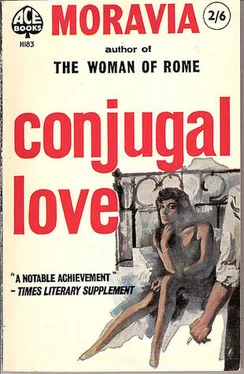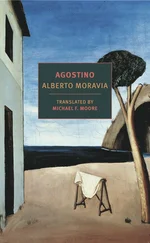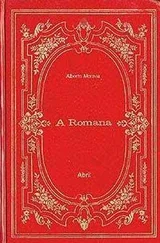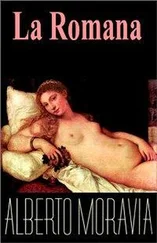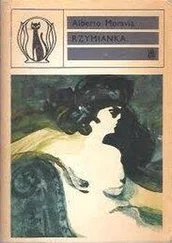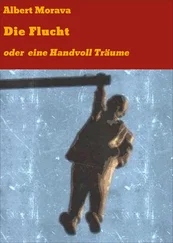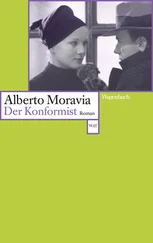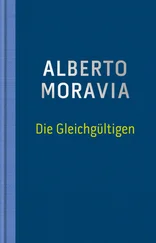I stretched out my hand towards a little table laden with knick-knacks that stood beside the sofa, and took up a red leather, gilt-edged memorandum book: it was an old 'keepsake' of 1860. Its former owner had made, on each page, a pen-and-ink drawing of a little landscape — very similar, in their homely style, to the prints I had just been looking at. Beneath each landscape, in a cursive 'English' calligraphy, were reflections and maxims in French. I looked at the landscapes one by one and read through many of these extremely sentimental and conventional reflections. Meanwhile drowsiness was coming over me. I put the book back on the table and dropped off to sleep.
I slept for perhaps an hour. In my sleep I seemed, every now and then, to wake up, and I could see the desk, the chair, the typewriter, and thought I ought to be working, and was conscious of a bitter feeling of impotence. Finally, as though at a signal, I awoke completely and leapt to my feet.
The room was plunged in gloom. I went to the window, threw open the shutters; the sky was still luminous, but the sun was low and came in slantingly through the window. Without thinking of anything I sat down at the desk and started typing.
I tapped out a couple of pages mechanically and then, at the third, broke off and fell into deep meditation. Actually I was not thinking at all; merely I could not get the sense of the words that I had written with such ardour a few days before. I saw that they were words, but they remained mere words and it seemed to me that they had no weight, no meaning. They were parts of speech, not objects, parts of speech such as are drawn up in rows on the pages of dictionaries, parts of speech and nothing more. At that moment my wife appeared in the doorway, asking whether I wanted to have tea. I welcomed this proposal with relief, glad of some distraction from the feeling of remoteness and absurdity that I experienced in front of my manuscript; and I followed her downstairs. She was already dressed for our customary walk, and tea was on the table. I pulled myself together with an effort and began chatting in a self-possessed manner as I drank my tea. My wife now appeared less abstracted and preoccupied, and this pleased me. After tea we went out and strolled down the drive towards the gate.
As I have already said, there were few walks in that neighbourhood: and so we turned off down a lane that we knew extremely well, through the fields. I walked in front and Leda followed me. My mind, as I soon realized, was still bogged in that sensation of vagueness and lack of comprehension that my manuscript had aroused in me, but I made an effort — with, to tell the truth, only partial success — to thrust away this preoccupation and to talk lightly of unimportant matters. The lane wound about amongst the fields, according to the lay-out of the various farms, linking the groups of farm buildings together. Sometimes it would coincide with a threshing-floor, in front of an isolated cottage; and then it would start twisting about again between two hedges, or along a ditch beside a vegetable garden, or by the last row of vines at the edge of a vineyard. In the clear, even, brilliant autumn light the entire plain was visible, as far as the eye could reach — every field, every patch of cultivation — flat, luminous, with a few trees here and there, dark against their background of clear sky but with every leaf lit up in the sunshine. When we came to a little hump-backed bridge spanning a deep ditch I stopped to look at the view and my wife went on in front. I remember that she was wearing a coat and skirt of grey cloth flecked with red, green, yellow and blue. When I first glanced after her as she walked ahead I was frightened, because it suddenly seemed to me that she too, like the words of my manuscript, was nothing more than a speck in space. I said, gently: 'Leda', and felt I was saying the most absurd thing in the world. I went on: 'My name is Silvio Baldeschi and I married a woman whose name is Leda'; and I felt I had not said anything at all. It came into my mind, all of a sudden, that the only way I could escape from this atmosphere of unreality was by receiving or inflicting pain — for instance by seizing my wife by the hair, throwing her down on the sharp stones of the path, and receiving from her, in turn, a good kick on the shins. In the same way, perhaps I should awaken to the value of my manuscript by tearing it up and throwing it into the fire.
These reflections brought me a vivid feeling that I must be mad: was it not then possible to lay hold of one's own, or other people's, existence except through the medium of pain? But I consoled myself slightly with the thought that if it were so, if not only what I had written but also my wife, whom I knew I loved, seemed to me incomprehensible, then this feeling of absurdity did not depend upon the quality of what I had written but upon myself.
My wife was looking for a place to sit down — a difficult matter in a countryside like that, where every foot of space was cultivated, every plant had its use, and every clod of earth held a seed. We came at last to a cleft in the ground at the bottom of which ran a little stream called — perhaps because of its twisting course — the Ess. At this point the grassy banks sloped gently down, and the stream formed a tiny pool, like a round mirror, of dense green water, overshadowed by three or four poplar trees. A sloping strip of cement, half in and half out of the water, such as is used by women for beating and wringing out clothes, showed that this apparently remote spot was used as a washing-place. But in any case, as Leda said, throwing herself down on the grass, in this part of the country every little corner is put to some use and there is nothing to be done about it.
We started talking quietly, in that moment just before sunset when both light and sound are softened. My wife had picked a blade of grass and was chewing it; and I, sitting a little lower down the bank, was looking at the vague shadows of the poplars reflected in the glassy water of the stream. We spoke for a little about the day and the place, and then, on a very slight pretext (I had asked her if she would like to go up into the mountains in the winter) she started relating an episode in her past life which had, in fact, occurred in a mountain resort two years before. My wife's first marriage, as I have already explained, lasted only a very short time, and after that, for ten years, she had lived alone and had had, as I was aware, numerous lovers. I had no feelings of jealousy for these predecessors of mine, and she, seeing that I was indifferent, had taken to talking about them, circumspectly at first and then quite openly. Why she should have done so, I do not know: perhaps out of vanity, or — in her present very different circumstances — from a vestige of regret for the uncontrolled freedom she had enjoyed. I cannot say that these stories gave me any pleasure; when I least expected it, I would feel myself giving a start of surprise, the involuntary effect, as it were, of a sensibility I did not know I possessed. Certainly this was not jealousy; nor, however, was it the complete, rational objectivity that I prided myself on being able to display. But when, that day, chewing her blade of grass, her eyes staring fixedly not at me but at something which she perhaps saw in her imagination, she told me the story of one of her adventures, I was aware that the slightly uncomfortable feeling that her reminiscences usually aroused in me was, this time, proving agreeable, like a fortifying tonic to someone who is feeling faint. When I sat down I had been a prey to a distressing sense of unreality; and now that warm, sensual voice of hers was speaking to me of real things, of things which had really happened and which, into the bargain, had happened to her and were displeasing to me. In others, more hot-blooded, these memories might perhaps have kindled a raging hatred; but to me, bloodless as I was, they restored the sense of what I myself was and of what she was to me. Certainly I suffered when I listened to her telling me, quite plainly, how she had allowed herself to be approached by a man she liked, how she had let herself be kissed, how they had slept together; but this suffering, just sufficing, as it did, to re-awaken my failing vitality, became almost pleasant and lost its harmful and gratuitous quality. It was a poison, perhaps, but one of those poisons which, taken in small doses, restore the patient to life.
Читать дальше
